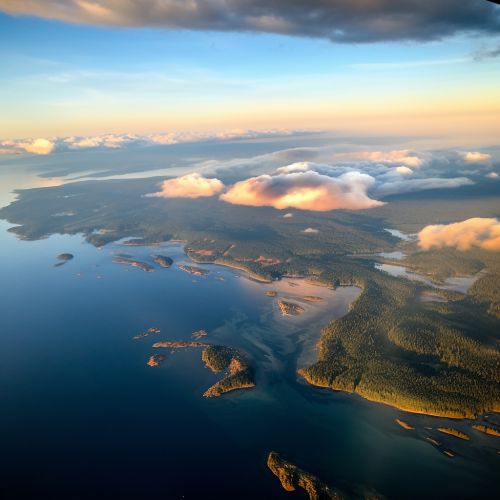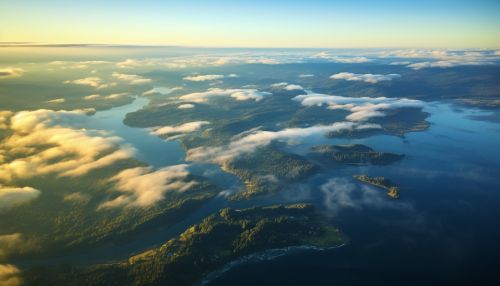Puget Sound
Geography
Puget Sound is a complex estuarine system of interconnected marine waterways and basins, with one major and two minor connections to the open Pacific Ocean via the Strait of Juan de Fuca. It extends approximately 100 miles (160 km) from Deception Pass in the north to Olympia, Washington in the south. Its average depth is 450 feet (140 m) and its maximum depth, off Point Jefferson between Indianola and Kingston, is 930 feet (280 m). The depth of the main basin, between the southern tip of Whidbey Island and Tacoma, Washington, is approximately 600 feet (180 m).


Geology
The Puget Sound region is characterized by a complex geological history, involving tectonic activity, glaciation, and sedimentation. The region is part of the Cascadia subduction zone, where the Juan de Fuca Plate is subducting beneath the North American Plate, leading to volcanic activity in the form of the Cascade Range.
Ecology
Puget Sound is home to a diverse array of marine life, including numerous species of fish, shellfish, birds, and mammals. It is particularly known for its populations of Pacific salmon, Dungeness crab, and orca whales. The Sound's unique ecosystem is heavily influenced by the freshwater input from the many rivers and streams that flow into it, as well as the tidal action of the Pacific Ocean.
Human History
The Puget Sound region has been inhabited by Native American tribes for thousands of years. The Duwamish tribe, among others, have a long history in the area. European exploration of the region began in the late 18th century, with the arrival of British and Spanish expeditions. The Sound was named by George Vancouver for Lieutenant Peter Puget, who explored its southern reaches in May 1792.
Economy
The Puget Sound region is a major hub of economic activity, with industries ranging from technology and aerospace to fishing and forestry. The region is home to several Fortune 500 companies, including Microsoft and Amazon. The Port of Seattle and the Port of Tacoma are among the busiest ports in the United States.
Environmental Issues
There are numerous environmental issues facing Puget Sound, including pollution from urban runoff, habitat loss, and the decline of certain species, such as the southern resident orca whales. Efforts to restore and protect the Sound's environment are coordinated by the Puget Sound Partnership, a state agency.
